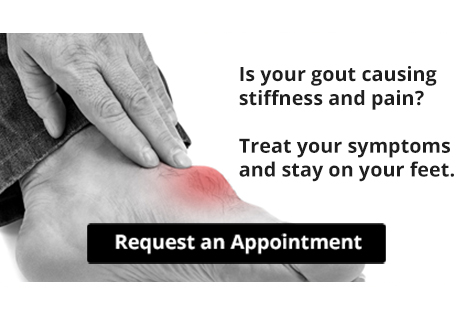Items filtered by date: December 2020
Can Running Injuries Be Prevented?
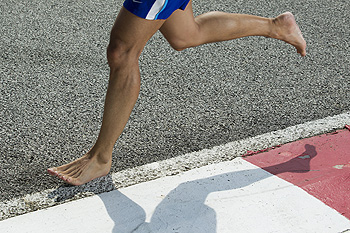 Some running injuries may be prevented by practicing proper training methods. The feet are often affected by running injuries, and unfortunately this can make it quite difficult to accomplish daily activities. It is important to strengthen the body, and this may help to gradually increase the mileage and intensity of your runs. It is beneficial to build strength in the legs separately, helping to decrease injury risk. Reverse lunges are known to improve stability, in addition to strengthening the lower part of the body. Flexibility in the hips and glutes may be increased when single leg deadlifts are frequently performed, and may become more challenging when a weight is held. If you would like additional information about how to prevent running injuries, please speak with a podiatrist.
Some running injuries may be prevented by practicing proper training methods. The feet are often affected by running injuries, and unfortunately this can make it quite difficult to accomplish daily activities. It is important to strengthen the body, and this may help to gradually increase the mileage and intensity of your runs. It is beneficial to build strength in the legs separately, helping to decrease injury risk. Reverse lunges are known to improve stability, in addition to strengthening the lower part of the body. Flexibility in the hips and glutes may be increased when single leg deadlifts are frequently performed, and may become more challenging when a weight is held. If you would like additional information about how to prevent running injuries, please speak with a podiatrist.
Exercising your feet regularly with the proper foot wear is a great way to prevent injuries. If you have any concerns about your feet, contact Dr. John Branwell of Kearny, New Jersey. Our doctor will treat your foot and ankle needs.
How to Prevent Running Injuries
Many common running injuries are caused by overuse and overtraining. When the back of the kneecap starts wearing out and starts causing pain in your knee, this is commonly referred to as runner’s knee. Runner’s knee is a decrease in strength in your quadriceps and can occur if you’re not wearing properly fitted or supporting shoes. To prevent runner’s knee, focusing on hip strengthening is a good idea, as well as strengthening your quads to keep the kneecaps aligned.
What Are Some Causes of Running Injuries?
- One cause of a common running injury is called iliotibial band syndrome.
- Plantar fasciitis is also another common injury.
- Stress fractures can occur from overtraining, lack of calcium, or even your running style.
Best Ways to Prevent Running Injuries
- Wear footwear that fits properly and suits your running needs.
- Running shoes are the only protective gear that runners have to safeguard them from injury.
- Make a training schedule. Adding strengthening exercises as well as regular stretching can help keep you strong and limber and can lessen the possibility of injuries.
- Stretching keeps muscles limber; this will help you gain better flexibility.
If you have any questions please feel free to contact our office located in Kearny, NJ . We offer the newest diagnostic and treatment technologies for all your foot and ankle needs.
Gout Pain Can Be Managed
Can Running Injuries Be Prevented?
 Some running injuries may be prevented by practicing proper training methods. The feet are often affected by running injuries, and unfortunately this can make it quite difficult to accomplish daily activities. It is important to strengthen the body, and this may help to gradually increase the mileage and intensity of your runs. It is beneficial to build strength in the legs separately, helping to decrease injury risk. Reverse lunges are known to improve stability, in addition to strengthening the lower part of the body. Flexibility in the hips and glutes may be increased when single leg deadlifts are frequently performed, and may become more challenging when a weight is held. If you would like additional information about how to prevent running injuries, please speak with a podiatrist.
Some running injuries may be prevented by practicing proper training methods. The feet are often affected by running injuries, and unfortunately this can make it quite difficult to accomplish daily activities. It is important to strengthen the body, and this may help to gradually increase the mileage and intensity of your runs. It is beneficial to build strength in the legs separately, helping to decrease injury risk. Reverse lunges are known to improve stability, in addition to strengthening the lower part of the body. Flexibility in the hips and glutes may be increased when single leg deadlifts are frequently performed, and may become more challenging when a weight is held. If you would like additional information about how to prevent running injuries, please speak with a podiatrist.
Exercising your feet regularly with the proper foot wear is a great way to prevent injuries. If you have any concerns about your feet, contact Dr. John Branwell of Kearny, New Jersey. Our doctor will treat your foot and ankle needs.
How to Prevent Running Injuries
Many common running injuries are caused by overuse and overtraining. When the back of the kneecap starts wearing out and starts causing pain in your knee, this is commonly referred to as runner’s knee. Runner’s knee is a decrease in strength in your quadriceps and can occur if you’re not wearing properly fitted or supporting shoes. To prevent runner’s knee, focusing on hip strengthening is a good idea, as well as strengthening your quads to keep the kneecaps aligned.
What Are Some Causes of Running Injuries?
- One cause of a common running injury is called iliotibial band syndrome.
- Plantar fasciitis is also another common injury.
- Stress fractures can occur from overtraining, lack of calcium, or even your running style.
Best Ways to Prevent Running Injuries
- Wear footwear that fits properly and suits your running needs.
- Running shoes are the only protective gear that runners have to safeguard them from injury.
- Make a training schedule. Adding strengthening exercises as well as regular stretching can help keep you strong and limber and can lessen the possibility of injuries.
- Stretching keeps muscles limber; this will help you gain better flexibility.
If you have any questions please feel free to contact our office located in Kearny, NJ . We offer the newest diagnostic and treatment technologies for all your foot and ankle needs.
Read more about Preventing Running InjuriesGout Pain Can Be Managed
Foot Conditions Caused by High Heels
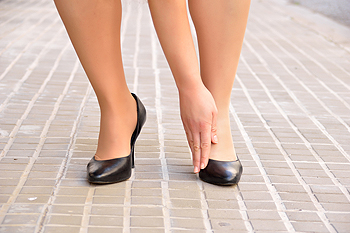 There are many women who enjoy wearing high heels, but they may not be aware of the potential foot conditions that they can cause. Painful foot ailments may be prevented when certain measures are implemented. These can include choosing shoes that fit perfectly, which can provide an adequate amount of ankle support. Additionally, some women find it helpful to stretch the shoe slightly by wearing socks, as this may help to provide a good fit. It can be beneficial to wear different types of high heels, and a smaller heel may help alleviate aching feet. Blisters can be a common ailment as a result of wearing high heels, and it may help to wear a bandage over problem areas. If you would like additional information about the effect high heels may have on your feet, please confer with a podiatrist.
There are many women who enjoy wearing high heels, but they may not be aware of the potential foot conditions that they can cause. Painful foot ailments may be prevented when certain measures are implemented. These can include choosing shoes that fit perfectly, which can provide an adequate amount of ankle support. Additionally, some women find it helpful to stretch the shoe slightly by wearing socks, as this may help to provide a good fit. It can be beneficial to wear different types of high heels, and a smaller heel may help alleviate aching feet. Blisters can be a common ailment as a result of wearing high heels, and it may help to wear a bandage over problem areas. If you would like additional information about the effect high heels may have on your feet, please confer with a podiatrist.
High heels have a history of causing foot and ankle problems. If you have any concerns about your feet or ankles, contact Dr. John Branwell from Kearny, New Jersey. Our doctor can provide the care you need to keep you pain-free and on your feet.
Effects of High Heels on the Feet
High heels are popular shoes among women because of their many styles and societal appeal. Despite this, high heels can still cause many health problems if worn too frequently.
Which Parts of My Body Will Be Affected by High Heels?
- Ankle Joints
- Achilles Tendon – May shorten and stiffen with prolonged wear
- Balls of the Feet
- Knees – Heels cause the knees to bend constantly, creating stress on them
- Back – They decrease the spine’s ability to absorb shock, which may lead to back pain. The vertebrae of the lower back may compress.
What Kinds of Foot Problems Can Develop from Wearing High Heels?
- Corns
- Calluses
- Hammertoe
- Bunions
- Morton’s Neuroma
- Plantar Fasciitis
How Can I Still Wear High Heels and Maintain Foot Health?
If you want to wear high heeled shoes, make sure that you are not wearing them every day, as this will help prevent long term physical problems. Try wearing thicker heels as opposed to stilettos to distribute weight more evenly across the feet. Always make sure you are wearing the proper shoes for the right occasion, such as sneakers for exercising. If you walk to work, try carrying your heels with you and changing into them once you arrive at work. Adding inserts to your heels can help cushion your feet and absorb shock. Full foot inserts or metatarsal pads are available.
If you have any questions please feel free to contact our office located in Kearny, NJ . We offer the newest diagnostic and treatment technologies for all your foot and ankle needs.
Foot Conditions Caused by High Heels
 There are many women who enjoy wearing high heels, but they may not be aware of the potential foot conditions that they can cause. Painful foot ailments may be prevented when certain measures are implemented. These can include choosing shoes that fit perfectly, which can provide an adequate amount of ankle support. Additionally, some women find it helpful to stretch the shoe slightly by wearing socks, as this may help to provide a good fit. It can be beneficial to wear different types of high heels, and a smaller heel may help alleviate aching feet. Blisters can be a common ailment as a result of wearing high heels, and it may help to wear a bandage over problem areas. If you would like additional information about the effect high heels may have on your feet, please confer with a podiatrist.
There are many women who enjoy wearing high heels, but they may not be aware of the potential foot conditions that they can cause. Painful foot ailments may be prevented when certain measures are implemented. These can include choosing shoes that fit perfectly, which can provide an adequate amount of ankle support. Additionally, some women find it helpful to stretch the shoe slightly by wearing socks, as this may help to provide a good fit. It can be beneficial to wear different types of high heels, and a smaller heel may help alleviate aching feet. Blisters can be a common ailment as a result of wearing high heels, and it may help to wear a bandage over problem areas. If you would like additional information about the effect high heels may have on your feet, please confer with a podiatrist.
High heels have a history of causing foot and ankle problems. If you have any concerns about your feet or ankles, contact Dr. John Branwell from Kearny, New Jersey. Our doctor can provide the care you need to keep you pain-free and on your feet.
Effects of High Heels on the Feet
High heels are popular shoes among women because of their many styles and societal appeal. Despite this, high heels can still cause many health problems if worn too frequently.
Which Parts of My Body Will Be Affected by High Heels?
- Ankle Joints
- Achilles Tendon – May shorten and stiffen with prolonged wear
- Balls of the Feet
- Knees – Heels cause the knees to bend constantly, creating stress on them
- Back – They decrease the spine’s ability to absorb shock, which may lead to back pain. The vertebrae of the lower back may compress.
What Kinds of Foot Problems Can Develop from Wearing High Heels?
- Corns
- Calluses
- Hammertoe
- Bunions
- Morton’s Neuroma
- Plantar Fasciitis
How Can I Still Wear High Heels and Maintain Foot Health?
If you want to wear high heeled shoes, make sure that you are not wearing them every day, as this will help prevent long term physical problems. Try wearing thicker heels as opposed to stilettos to distribute weight more evenly across the feet. Always make sure you are wearing the proper shoes for the right occasion, such as sneakers for exercising. If you walk to work, try carrying your heels with you and changing into them once you arrive at work. Adding inserts to your heels can help cushion your feet and absorb shock. Full foot inserts or metatarsal pads are available.
If you have any questions please feel free to contact our office located in Kearny, NJ . We offer the newest diagnostic and treatment technologies for all your foot and ankle needs.
Read more about Why High Heels Are Not Ideal for Healthy FeetWhat Can Cause Flat Feet?
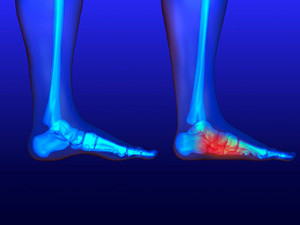 When the foot lies completely on the floor while standing barefoot, it may be indicative of a condition that is known as flat feet. The gap that is found between the arch and floor is nonexistent, and this may affect the natural gait. It can happen from genetic reasons, or possibly from an injury. There are medical conditions that may cause flat feet to develop. These can include cerebral palsy, diabetes, or obesity, which may affect the nerves. Some of the symptoms that are generally associated with this condition can consist of tired feet, pain in the heel and arch area, and it may be difficult to stand. Many patients choose to wear supportive devices in their shoes, in addition to performing stretches that can strengthen the feet. If you are afflicted with flat feet and they are causing you pain, it is suggested that you consult with a podiatrist who can recommend correct treatment methods for you.
When the foot lies completely on the floor while standing barefoot, it may be indicative of a condition that is known as flat feet. The gap that is found between the arch and floor is nonexistent, and this may affect the natural gait. It can happen from genetic reasons, or possibly from an injury. There are medical conditions that may cause flat feet to develop. These can include cerebral palsy, diabetes, or obesity, which may affect the nerves. Some of the symptoms that are generally associated with this condition can consist of tired feet, pain in the heel and arch area, and it may be difficult to stand. Many patients choose to wear supportive devices in their shoes, in addition to performing stretches that can strengthen the feet. If you are afflicted with flat feet and they are causing you pain, it is suggested that you consult with a podiatrist who can recommend correct treatment methods for you.
Flatfoot is a condition many people suffer from. If you have flat feet, contact Dr. John Branwell from Kearny, New Jersey. Our doctor will treat your foot and ankle needs.
What Are Flat Feet?
Flatfoot is a condition in which the arch of the foot is depressed and the sole of the foot is almost completely in contact with the ground. About 20-30% of the population generally has flat feet because their arches never formed during growth.
Conditions & Problems:
Having flat feet makes it difficult to run or walk because of the stress placed on the ankles.
Alignment – The general alignment of your legs can be disrupted, because the ankles move inward which can cause major discomfort.
Knees – If you have complications with your knees, flat feet can be a contributor to arthritis in that area.
Symptoms
- Pain around the heel or arch area
- Trouble standing on the tip toe
- Swelling around the inside of the ankle
- Flat look to one or both feet
- Having your shoes feel uneven when worn
Treatment
If you are experiencing pain and stress on the foot you may weaken the posterior tibial tendon, which runs around the inside of the ankle.
If you have any questions please feel free to contact our office located in Kearny, NJ . We offer the newest diagnostic and treatment technologies for all your foot and ankle needs.
What Can Cause Flat Feet?
 When the foot lies completely on the floor while standing barefoot, it may be indicative of a condition that is known as flat feet. The gap that is found between the arch and floor is nonexistent, and this may affect the natural gait. It can happen from genetic reasons, or possibly from an injury. There are medical conditions that may cause flat feet to develop. These can include cerebral palsy, diabetes, or obesity, which may affect the nerves. Some of the symptoms that are generally associated with this condition can consist of tired feet, pain in the heel and arch area, and it may be difficult to stand. Many patients choose to wear supportive devices in their shoes, in addition to performing stretches that can strengthen the feet. If you are afflicted with flat feet and they are causing you pain, it is suggested that you consult with a podiatrist who can recommend correct treatment methods for you.
When the foot lies completely on the floor while standing barefoot, it may be indicative of a condition that is known as flat feet. The gap that is found between the arch and floor is nonexistent, and this may affect the natural gait. It can happen from genetic reasons, or possibly from an injury. There are medical conditions that may cause flat feet to develop. These can include cerebral palsy, diabetes, or obesity, which may affect the nerves. Some of the symptoms that are generally associated with this condition can consist of tired feet, pain in the heel and arch area, and it may be difficult to stand. Many patients choose to wear supportive devices in their shoes, in addition to performing stretches that can strengthen the feet. If you are afflicted with flat feet and they are causing you pain, it is suggested that you consult with a podiatrist who can recommend correct treatment methods for you.
Flatfoot is a condition many people suffer from. If you have flat feet, contact Dr. John Branwell from Kearny, New Jersey. Our doctor will treat your foot and ankle needs.
What Are Flat Feet?
Flatfoot is a condition in which the arch of the foot is depressed and the sole of the foot is almost completely in contact with the ground. About 20-30% of the population generally has flat feet because their arches never formed during growth.
Conditions & Problems:
Having flat feet makes it difficult to run or walk because of the stress placed on the ankles.
Alignment – The general alignment of your legs can be disrupted, because the ankles move inward which can cause major discomfort.
Knees – If you have complications with your knees, flat feet can be a contributor to arthritis in that area.
Symptoms
- Pain around the heel or arch area
- Trouble standing on the tip toe
- Swelling around the inside of the ankle
- Flat look to one or both feet
- Having your shoes feel uneven when worn
Treatment
If you are experiencing pain and stress on the foot you may weaken the posterior tibial tendon, which runs around the inside of the ankle.
If you have any questions please feel free to contact our office located in Kearny, NJ . We offer the newest diagnostic and treatment technologies for all your foot and ankle needs.
Read more about FlatfootWhat Is Causing My Foot Pain?
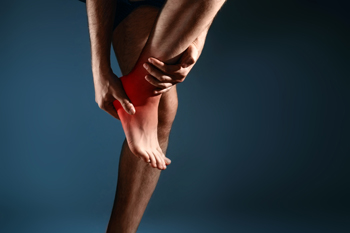 Pain is a common symptom of many foot problems. When going to the doctor, it is helpful to describe where in the foot the pain is occurring and under what conditions you feel it. Pain in certain areas of the foot and at certain times is often associated with specific conditions. For example, pain in the sole of the foot that is most intense when taking your first steps after a long rest, such as when you first wake up in the morning, can be indicative of plantar fasciitis. Sharp pain in the back of your foot that worsens with activity and is accompanied by tenderness in the Achilles tendon may be a sign of Achilles tendinopathy. Burning, tingling, or shooting pains in the ankle and heel that worsen with standing and activity may be indicative of tarsal tunnel syndrome. Regardless of what may be causing your pain, a podiatrist can examine your foot and diagnose the problem. If you are experiencing foot pain, consult with a podiatrist today.
Pain is a common symptom of many foot problems. When going to the doctor, it is helpful to describe where in the foot the pain is occurring and under what conditions you feel it. Pain in certain areas of the foot and at certain times is often associated with specific conditions. For example, pain in the sole of the foot that is most intense when taking your first steps after a long rest, such as when you first wake up in the morning, can be indicative of plantar fasciitis. Sharp pain in the back of your foot that worsens with activity and is accompanied by tenderness in the Achilles tendon may be a sign of Achilles tendinopathy. Burning, tingling, or shooting pains in the ankle and heel that worsen with standing and activity may be indicative of tarsal tunnel syndrome. Regardless of what may be causing your pain, a podiatrist can examine your foot and diagnose the problem. If you are experiencing foot pain, consult with a podiatrist today.
Foot Pain
Foot pain can be extremely painful and debilitating. If you have a foot pain, consult with Dr. John Branwell from Kearny, New Jersey. Our doctor will assess your condition and provide you with quality foot and ankle treatment.
Causes
Foot pain is a very broad condition that could be caused by one or more ailments. The most common include:
- Bunions
- Hammertoes
- Plantar Fasciitis
- Bone Spurs
- Corns
- Tarsal Tunnel Syndrome
- Ingrown Toenails
- Arthritis (such as Gout, Rheumatoid, and Osteoarthritis)
- Flat Feet
- Injury (from stress fractures, broken toe, foot, ankle, Achilles tendon ruptures, and sprains)
- And more
Diagnosis
To figure out the cause of foot pain, podiatrists utilize several different methods. This can range from simple visual inspections and sensation tests to X-rays and MRI scans. Prior medical history, family medical history, and any recent physical traumatic events will all be taken into consideration for a proper diagnosis.
Treatment
Treatment depends upon the cause of the foot pain. Whether it is resting, staying off the foot, or having surgery; podiatrists have a number of treatment options available for foot pain.
If you have any questions, please feel free to contact our office located in Kearny, NJ . We offer the newest diagnostic and treatment technologies for all your foot care needs.
What Is Causing My Foot Pain?
 Pain is a common symptom of many foot problems. When going to the doctor, it is helpful to describe where in the foot the pain is occurring and under what conditions you feel it. Pain in certain areas of the foot and at certain times is often associated with specific conditions. For example, pain in the sole of the foot that is most intense when taking your first steps after a long rest, such as when you first wake up in the morning, can be indicative of plantar fasciitis. Sharp pain in the back of your foot that worsens with activity and is accompanied by tenderness in the Achilles tendon may be a sign of Achilles tendinopathy. Burning, tingling, or shooting pains in the ankle and heel that worsen with standing and activity may be indicative of tarsal tunnel syndrome. Regardless of what may be causing your pain, a podiatrist can examine your foot and diagnose the problem. If you are experiencing foot pain, consult with a podiatrist today.
Pain is a common symptom of many foot problems. When going to the doctor, it is helpful to describe where in the foot the pain is occurring and under what conditions you feel it. Pain in certain areas of the foot and at certain times is often associated with specific conditions. For example, pain in the sole of the foot that is most intense when taking your first steps after a long rest, such as when you first wake up in the morning, can be indicative of plantar fasciitis. Sharp pain in the back of your foot that worsens with activity and is accompanied by tenderness in the Achilles tendon may be a sign of Achilles tendinopathy. Burning, tingling, or shooting pains in the ankle and heel that worsen with standing and activity may be indicative of tarsal tunnel syndrome. Regardless of what may be causing your pain, a podiatrist can examine your foot and diagnose the problem. If you are experiencing foot pain, consult with a podiatrist today.
Foot Pain
Foot pain can be extremely painful and debilitating. If you have a foot pain, consult with Dr. John Branwell from Kearny, New Jersey. Our doctor will assess your condition and provide you with quality foot and ankle treatment.
Causes
Foot pain is a very broad condition that could be caused by one or more ailments. The most common include:
- Bunions
- Hammertoes
- Plantar Fasciitis
- Bone Spurs
- Corns
- Tarsal Tunnel Syndrome
- Ingrown Toenails
- Arthritis (such as Gout, Rheumatoid, and Osteoarthritis)
- Flat Feet
- Injury (from stress fractures, broken toe, foot, ankle, Achilles tendon ruptures, and sprains)
- And more
Diagnosis
To figure out the cause of foot pain, podiatrists utilize several different methods. This can range from simple visual inspections and sensation tests to X-rays and MRI scans. Prior medical history, family medical history, and any recent physical traumatic events will all be taken into consideration for a proper diagnosis.
Treatment
Treatment depends upon the cause of the foot pain. Whether it is resting, staying off the foot, or having surgery; podiatrists have a number of treatment options available for foot pain.
If you have any questions, please feel free to contact our office located in Kearny, NJ . We offer the newest diagnostic and treatment technologies for all your foot care needs.

